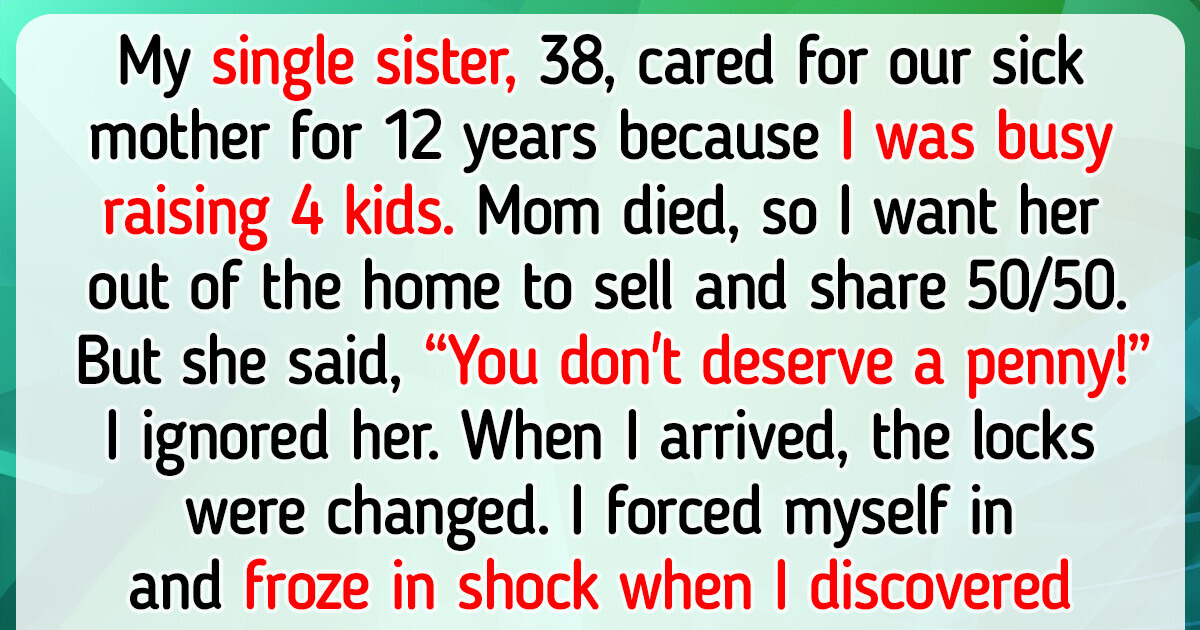Your sister gave up her life to care for your ailing mother. You took a different path and had multiple children that occupied your time. Your mom expressed her wishes in writing, deeding the house to your sister to help re-pay her kindness and devotion. Your sister could have left your mom to her own devices, pursued a career, a relationship, moved away etc. She did not. You need to get over your sense of entitlement and move on.
I Refuse to Give Up My Rights Just Because I Wasn’t a "Devoted Daughter"

Inheritance disputes often lead to tension, especially when siblings feel entitled to more than their fair share. After Cara’s mother passed away, her sister argued that she didn’t deserve an equal share of the family home, claiming she hadn’t been as devoted. The situation escalated when Cara visited the house, leaving her overwhelmed and unsure of how to proceed. Seeking guidance, she reached out to us for advice.
Cara’s letter:
Dear Bright Side,
My single sister, 38, cared for our sick mother for 12 years because I was busy raising 4 kids. Mom died, so I want her out of the home to sell and share 50/50. But she said, “You don't deserve a penny! You were not a devoted daughter!”
I ignored her. But when I arrived to the house, the locks were changed. I could see a shadow from the window, but I froze when I realized the house was almost empty.
I forced myself in and was shocked when I discovered my sister packing the last box of belongings. “What are you doing?” I asked. She just smiled and said, “Oh, didn’t I tell you? I sold the house.”
I was furious and told her she should have consulted me first because the house belonged to both of us. But then she handed me a document—a paper signed by our mother, stating that she would inherit 100% of the property. That’s when I realized the truth: my sister had convinced Mom to give the house entirely to her.
Smirking, she told me she had been waiting to see how I would act after Mom’s death. When she saw that I was so quick to kick her out and sell the property, she decided I didn’t deserve anything.
The house is legally hers, and I have no way to fight it. I feel lost. What should I do?
Cara
Hi Cara! Thank you for sharing your story. We’ve prepared some tips that can help you navigate through this situation.
Verify the legality of the document
Even though your sister handed you a signed paper, you should consult a probate or estate lawyer to verify its legitimacy. Wills and property transfers often require specific legal formalities, such as notarization or witnesses. If your mother was under duress, undue influence, or not of sound mind when she signed, the document may be contested in court.
Your sister cared for her for 12 years—if she pressured or manipulated her into changing the ownership, a lawyer could challenge the validity of the transfer.
Appeal to your sister’s sense of fairness

I was in a similar situation. I took care of my father for many years all while my younger brother criticized how I did it. After every thing was settled, then he upset because he hadn't gotten his money yet. I sent him a check by registered mail because I had a suspicious feeling. Next thing I know is that he talking to our oldest brother about hiring a lawyer.
While she believes she deserved the house because of her caregiving, she also waited to see how you would act before making her decision. That suggests she was still open to the idea of fairness at one point. Instead of fighting, try to have a heartfelt conversation about what your mother would have truly wanted.
Remind her that your mother raised both of you, and no matter what, you are still family. Propose a compromise—perhaps she could share part of the sale proceeds or allow you some other form of compensation, like personal items of sentimental value.
Let go and cut ties (if necessary)
Your sister’s actions—changing the locks, keeping you in the dark, and smirking as she revealed her plan—show a deep level of resentment and premeditation. If you believe there is no path to fairness or reconciliation, you may need to accept the loss, cut ties, and move on.
Holding onto bitterness won’t change the situation, and staying connected to someone who deliberately deceived you might only bring more heartache. Consider therapy or support groups to help process the betrayal and redirect your energy toward rebuilding your own financial and emotional stability.
Use this as a lesson for your own estate planning

Can look into legally if there is will and see if is fully hers or 50/50
Since you were blindsided by your mother’s decision, use this experience to ensure your own estate is planned transparently for your children. Clearly outline how your assets will be divided, discuss it openly with your kids, and put everything in a legally binding document with a lawyer to prevent confusion or manipulation later.
If you want to prevent your children from experiencing a similar betrayal, this is a wake-up call to establish clear communication and legal protections in your own estate.
Esther is facing a difficult situation with her sister over money. Despite being financially well-off, her sister refuses to help, even as Esther struggles to cover medical expenses for her sick child. Just when it seemed hopeless, an unexpected turn changed everything. Read the full story here.
Comments
Although your sister cared for your mom, she also lived rent free and had meals and utilities while she was there. Sure maybe she should be compensated for the time she took care of her but those other things should also be accounted for. I too think you should contest the legality of the will. I would fight for anything you are entitled to. After all, she did that to you, her sister, without discussing it with you. That tells me she did not want to be fair.
Talk about entitled! Just wants to breeze in after not helping for all those years and take half. Her Mom's action says it all. She did the right thing.
Now your hurt and you think she is selfish?? Who was it that was literally kicking her own sister to the curb for money?
Related Reads
12 Times Kindness Made Us Believe There Is Still Some Magic in the World

I Refuse to Return to the Office After My Coworker’s ‘Prank’ Revealed His Darkest Secret

I Refuse to Sacrifice My Retirement to Help My Unemployed Son, I’m Not His ATM

My DIL Pretended She Doesn’t Know Me in Public, and It Shattered Me

12 Heartwarming Moments That Show How Family Kindness Saves Lives

My Neighbor Disrespected My Privacy—My Revenge Was Sweet

My MIL Stole My Daughter’s $50K College Fund—The Consequences Were Immediate

I Refuse to Let a Strange Lady Touch My Rare Birthmark for "Good Luck"—Now I’m Being Threatened

My Parents Refused to Support Me Through Med School—Then I Discovered Their Sad Secret

10 Teachers Who Learned Life Lessons From Their Remarkable Students

I Refuse to Help My Parents Who Abandoned Me at 18

15 “How We Met” Stories Destined to Become Family Legends



